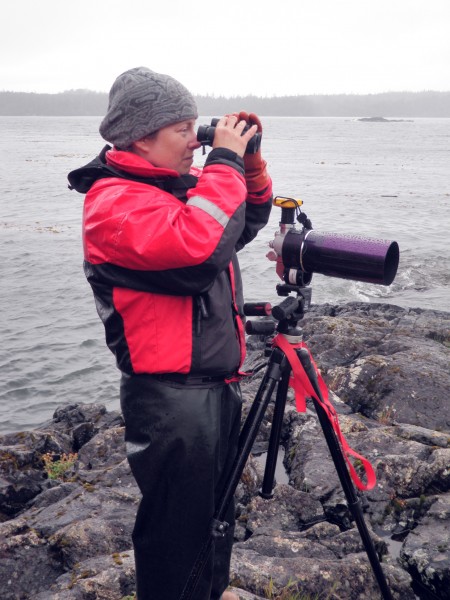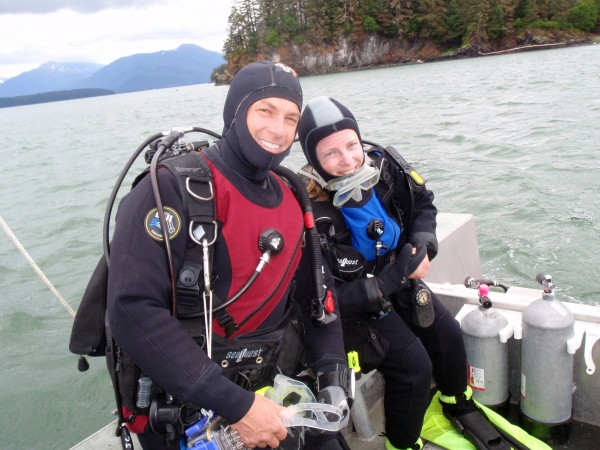Eckert inspires big-picture thinking in research, students
March 8, 2016
Lauren Frisch
907-474-5022
Ginny Eckert likes having a comprehensive understanding of the world around her.
Her work as an associate director of research at Alaska Sea Grant and a professor
at the University of Alaska Fairbanks School of Fisheries and Ocean Sciences has taken
her all over Alaska. Eckert and her graduate students have studied reproductive potential
of red king crabs in Bristol Bay and mating dynamics of snow crabs in the Bering Sea.
She has researched sea otters in Southeast Alaska and distributions of Dungeness crab
larvae at Glacier Bay National Park. Her fieldwork often involves underwater scuba
surveys or spending long hours observing animals.

Eckert also advises students, teaches undergraduate and graduate classes, coordinates and supervises research, and writes lots of research proposals.
“I don’t really have a typical day,” Eckert said.
With a background in shellfish, Eckert came to Alaska to study crab biology. Originally from New Jersey, she settled in Juneau in 2000 and works at the SFOS Lena Point Fisheries Facility. Eckert has a doctorate in ecology from the University of California Santa Barbara.
“I wanted to address issues related to commercial fisheries to help make our fisheries more sustainable,” she said. “Alaska is well known for having sustainable fisheries, but a lot of crab fisheries are in trouble.”
To get a larger perspective, Eckert focuses not only on the crabs, but also on their predators and prey. “I have studied everything from phytoplankton (crab food) to sea otters (crab predators). Shellfish is the theme that ties it all together,” she said.
To inspire the next generation of researchers to think about real-world questions similar to the way she looks at her own research questions, Eckert helped develop and is the director of the Marine Ecosystem Sustainability in the Arctic and Subarctic program, or MESAS, through the National Science Foundation. The interdisciplinary graduate program allows students to take courses in social and natural science, complete an internship, and plan and execute an interdisciplinary research project.
The MESAS program has given 31 students the opportunity to look at complex marine problems from a variety of perspectives and work with real people to address real problems. MESAS doctoral student Sonia Ibarra is studying the effects of sea otter recolonization on Southeast Alaska kelp communities. Doctoral student Ellen Chenoweth is studying why certain humpback whales are feeding at hatchery release sites in Chatham Strait.

Eckert’s broad frame of thinking has rubbed off on the program and her students. “Over the nine years I have known Ginny, she has been a tremendous mentor and advocate for thinking outside of the box,” said Ibarra. As the MESAS director, Eckert worked to make sure her students could think and work in multiple disciplines.
MESAS student Brandon Hassett was impressed by Eckert’s ability to develop a complex program from scratch.
“Any project that aims to bridge the natural and social sciences is extraordinarily ambitious,” Hassett said. “Ginny essentially developed a curriculum that incorporated the natural and social sciences, tailored the message to the Arctic, fast-tracked interdisciplinary syntheses with field experiences, then branded the entire process MESAS.”
Hassett believes the program, by merging disciplines and giving students real-world experience, was years ahead of its time. Eckert cut to the chase and focused on the skills necessary to train actual problem solvers.
“Ginny ensured her students received the opportunities she intended them to have,” Hassett said. “It is clear to me that she is a forward thinker, skilled at providing an outlet for creativity to manifest.”
The students became particularly interested in science communication and sought out different outlets to talk about their research. Eckert and the other faculty supported the students through many successful efforts to share their work, even when that support translated into a trip across the continent for a short event.
“I told Ginny that I submitted a homemade video of my research for a science communication outreach contest sponsored by the National Science Foundation,” said Chenoweth. “Her reaction after she found out I was entering was dismay because she was afraid I might win and she'd be forced to fly all the way to D.C. for the one-day award ceremony, which is exactly what happened.”


